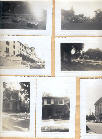
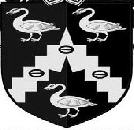
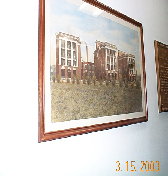
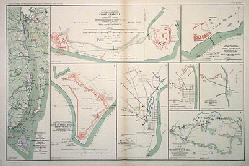
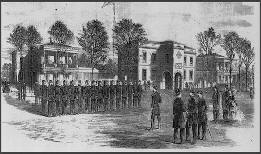
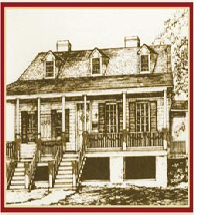



Walton crest Images of old Augusta, including the Arsenal, Meadow Garden, the Hospital, various pictures my mother took, and a Civil War map of the area
Walton Family, continued (page 5)
The children of Robert Walton (II) and Mary Hughes, four children
The “Signer” and his Siblings (continued)
The “Signer” and his Siblings (continued)
Robert Walton was the second child of Robert Walton and Mary Hughes. He was born 1744/1745, and died 12 Jul 1797 in Augusta, GA. Robert Hughes was appointed guardian to Robert Walton orphan of Robert Walton. "The name of Robert Walton appears as one of the 151 proscribed Rebels whose estates are declared forfeited by the British in 1780. It was either this Robert Walton or a first cousin of the same name. The list contains the names of George Walton and Robert Walton; the first as a colonel in the Rebel army, and the second as a commissioner of forfeited estates."
Notes of Mrs. E. Richards: Robert Walton (third of that name, going back to his grandfather Robert Walton who married Frances Sherwood). Apparently he was their second son based on the order of heirs named in the father's will. Besides his father Robert, Robert III had a maternal grandfather named Robert Hughes and a paternal grandfather named Robert Walton so he could have been named for any or all. No proof as to Robert III's actual birth date has been found but since his father's will was written in Feb. of 1746 naming both Robert and his brother John and a yet unborn third child, a good guess for this second child's birth date is 1744. His father Robert II died at the end of 1749 or early in 1750, so young Robert lost his father when he was only five or six years old. He and his siblings evidently lived with their mother, Mary Hughes Walton, at their home place at least until 1757 when the Cumberland court appointed a guardian for each child. Mary Walton had married a second time in 1754 to John Winfrey who had been the overseer or manager on the Walton place but no guardians were considered necessary until 1757. It is possible, even likely, that Mary Hughes Walton Winfrey's death was the event that made naming guardians for the minor children a necessity. Cumberland Co. Will Book 1 has many pages of guardian reports for the four Walton children (John, Robert, Sarah/Sally, and George). The reports are interesting and informative, listing expenditures for items of personal clothing, school teachers' hire, books, clothing for slaves, etc. and, in Robert's case, expenses to pack and market Robert's tobacco crop grown on land inherited from his father. In addition to expenses through the years, accounts of profits from slaves' hire and crops are listed.
The last guardian report on Robert Walton III is dated June 1761. If the supposed 1744 birth date for Robert III is used, he would have been only about 17 or 18 years old in 1761. If so, why were the guardian reports stopped? More research is needed.
There is a total absence of data on Robert III during the years from the last guardian report of June 1761 until June 26, 1767 when Robert Walton and Fanny his wife of Charlotte Co., VA sold land he inherited in Cumberland on a branch of Deep Creek near Peter Vale Church - 135 acres - for L 80 to John Stewart of Prince Edward Co., VA "which the said Robert Walton obtained by the last will and testament of his father Robert Walton". Robert's wife Frances Walton is identified as the daughter of John Carter and Elizabeth by a legacy she received in her father's 1785 will. John Carter, by a 1773 deed of gift, gave each one of Frances Carter Walton's three children: John Carter Walton, Mary Walton and Elizabeth Walton, a slave, so all the children were born by that date.
In November of 1770, John Stewart and Mary his wife of Cumberland Co. sold land in Prince Edward and Charlotte Co. on the Bush and Meherrin Rivers, 250 acres where Stewart used to live, to Robert Walton of Charlotte for L 100.
In 1772, Robert Walton of Charlotte was given Power of Attorney by his brother John who was living in Georgia to facilitate the partition of the remaining undivided lands the four Walton children (John, Robert, Sarah/Sally and George) had inherited from their father's estate. Research is needed to find what happened to these parcels of land.
On November 6, 1772, Robert Walton of Charlotte Co., VA executed a deed of trust. In it, Robert acknowledged that he owed Messr. Buchanan, Hastie and Co., merchants in Glasgow a sum of one hundred and twenty-two pounds, seventeen shillings and one penny. "In consideration of the debt and for and in consideration of the sum of five shillings ……….one certain tract or parcel of land lying and being the county of Charlotte on the River of Meherrin formerly the property of George Walton (this George Walton was Robert's uncle, the brother of his father Robert) containing by estimation five hundred acres be the same more or less …………….also nine Negroes Viz: Charles, Biron, Peter, James, Jenny, Sue, Nelle, Hannah, Jude with their children and increase and every advantage that may from them accrue, also one Negro boy named Mory…….." The property named was "sold" to the merchants in trust to secure the debt. The deed was recorded in Charlotte Co. Deed Book 3, page 212 on May 3, 1773.
In January 1773, Robert Walton of Charlotte sold the land on the Bush and Meherrin Rivers that he bought from John Stewart in 1770 to Joseph Pearson. Joseph Pearson was the Walton children's cousin, the son of Frances Walton Pearson, the Walton children's aunt. Robert had paid L100 for the 250 acres in 1770 but he sold the land in 1773 for only L 60. One of the witnesses to this deed was Henry Watkins who had married Temperance Hughes, Robert Walton's aunt.
In August of 1773, Robert Walton of Charlotte sold his slave Peter to Henry Watkins (his uncle by marriage) and George Moore for L 70. One wonders if this Peter is the same slave Robert put up as part of his collateral in November of 1772.
In August 1783, Robert Walton "of Charlotte Co." signed a document recorded in Charlotte Co, VA Deed Book 5, page 56. "Know all men by these presents that I, Robert Walton of Charlotte Co., for and in consideration of Henry Watkins and George Moore of Prince Edward Co., having entered into and executed a bond as security for me to Messr. Dreghorne, Murdock and Co., merchants in Glasgow (North Britain) for the payment of seventy pounds current money of Virginia with interest from the 27th day of August 1773 'til paid as also for and in the further consideration of the sum of five shillings like money to me in hand paid before the sealing and delivery hereof…… doth bargain, sell and deliver unto the said Henry Watkins and George Moore and to their heirs forever two Negro slaves named Will and Dick." Henry Watkins and George Moore were to have the right to take and possess or sell the slaves at any time when convenient or necessary "for their indemnification and safety for their securityship". Notice this debt was ten years old. The witnesses to this document were John Spencer and Robert Watkins. No other documents have been found concerning the debts Robert Walton owed to the Glasgow merchants.
Also in 1783, Robert Walton acquired a 250 acre tract in Georgia which he sold in 1788 to Cowles. George Walton, Robert Walton's younger brother, later acquired this land. The documents above indicate a move or an intended move from Charlotte Co., VA to Georgia by the Robert Walton family. By 1785, Robert Walton had acquired more land in Georgia in the District of Augusta so apparently the move was fully accomplished by that date. At this stage of the research, no other deeds or documents concerning purchase, sale or disposition of land in VA nor GA during Robert's lifetime have been found. Robert appears to have gotten in financial straits in VA which may have encouraged the family to make a new start in frontier GA.
Robert Walton died in July of 1797. From the newspaper: "On the 12th instant, Robert Walton, Sr, of Richmond County, planter. July 14, 1797." (The Sr. following this Robert's name may have been to distinguish him from his nephew Robert Walton, son of the Prince Edward Co. VA George Walton. The younger Robert Walton lived in GA.) Litigation over the elder Robert Walton's estate is found in Wilkes Co., GA records in 1798. "George Walton (this is Robert Walton's younger brother) states that he loaned $1,429 to Robert Walton so he could purchase several Negro slaves and various other items. John Carter Walton (this is Robert Walton's son), administrator of Robert Walton's estate, refuses to pay the debt owed by Robert Walton. George Walton now asks that John Walton be required to settle the account."
Nothing is known about Robert and Frances Carter Walton's daughters, Mary and Elizabeth, but there are records on the son John Carter Walton. In 1791, John Carter Walton witnessed a Power of Attorney from his cousin Robert Watkins of GA (son of Thos. and Sally Walton Watkins) to a friend to collect Robert's wife's inheritance in VA.
Robert Walton, brother of George - signer of the Declaration of Independence, married Frances Carter of Virginia and settled in Burke County, GA. All three brothers were prominent in the patriotic side of the Revolution.
Robert Walton and Frances Carter had three children:
1) John Carter Walton, died March 1804, killed in duel (see notes below. He was killed in a duel defending his uncle George Walton (the signer’s) honor).
2) Mary Walton (nothing else known)
3) Elizabeth Walton (nothing else known)
John Carter Walton. In June 1789, John Carter Walton was second lieutenant in the Richmond County militia, when the governor requested a troop of horse be formed. It was under the leadership of Col. James Stallings and Capt. Robert Watkins. 1792-93, John C. Walton was among the list of men authorized to issue and sign subpoenas.
To understand some of the dynamics at work in Richmond County, GA at this time, we must take into account the actions of John Carter Walton’s cousins, Robert and George Watkins (sons of Sally Walton and Thomas Watkins). Robert and George Watkins were commissioned by the state legislature to write the first “Digest of the Laws of Georgia.” The scandal of the Yazoo Act touched every politician in the State, and Robert and George included this infamous act in their “Digest,” at the same time noting its repeal. The governor and the legislature refused to pay Robert and George for their work; they would have preferred that the Yazoo Act had never been mentioned at all! The angry response of Robert Watkins led him to be engaged in several duels with other prominent men in the area.
In the papers of Gen. Thomas Flournoy (1775-1857), it states that in 1800 he was among those lawyers who subscribed to the Watkins “Digest.” July 25, 1799, there is a a "strongly worded" letter arguing with Watkins over the outcome of a lawsuit in Columbia County. Flournoy closed his letter by challenging Watkins to a duel. Also included are a number of letters from Flournoy to GEORGE WALTON, covering the period of July of 1803 to January of 1804. In March of 1804, however, the correspondence was between Flournoy and JOHN CARTER WALTON, and led to a duel between the two men. These letters were "highly charged in their language" and concerned an argument over the cases Thomas Flournoy vs. George Walton, and Matthias Maher vs. George Walton. In one document Flournoy challenged John Carter Walton to a duel.
"On 6 March of that year the seconds for the two men signed the following document, "Rules for duel between Thomas Flournoy and JOHN CARTER WALTON, signed by the seconds. Apparently JOHN C. WALTON, a relative of George Walton, whose honor he claimed to be upholding by the duel, died as a result, and the challenge was annotated,
The last guardian report on Robert Walton III is dated June 1761. If the supposed 1744 birth date for Robert III is used, he would have been only about 17 or 18 years old in 1761. If so, why were the guardian reports stopped? More research is needed.
There is a total absence of data on Robert III during the years from the last guardian report of June 1761 until June 26, 1767 when Robert Walton and Fanny his wife of Charlotte Co., VA sold land he inherited in Cumberland on a branch of Deep Creek near Peter Vale Church -
In November of 1770, John Stewart and Mary his wife of Cumberland Co. sold land in Prince Edward and Charlotte Co. on the Bush and Meherrin Rivers, 250 acres where Stewart used to live, to Robert Walton of Charlotte for L 100.
In 1772, Robert Walton of Charlotte was given Power of Attorney by his brother John who was living in Georgia to facilitate the partition of the remaining undivided lands the four Walton children (John, Robert, Sarah/Sally and George) had inherited from their father's estate. Research is needed to find what happened to these parcels of land.
On November 6, 1772, Robert Walton of Charlotte Co., VA executed a deed of trust. In it, Robert acknowledged that he owed Messr. Buchanan, Hastie and Co., merchants in Glasgow a sum of one hundred and twenty-
In January 1773, Robert Walton of Charlotte sold the land on the Bush and Meherrin Rivers that he bought from John Stewart in 1770 to Joseph Pearson. Joseph Pearson was the Walton children's cousin, the son of Frances Walton Pearson, the Walton children's aunt. Robert had paid L100 for the 250 acres in 1770 but he sold the land in 1773 for only L 60. One of the witnesses to this deed was Henry Watkins who had married Temperance Hughes, Robert Walton's aunt.
In August of 1773, Robert Walton of Charlotte sold his slave Peter to Henry Watkins (his uncle by marriage) and George Moore for L 70. One wonders if this Peter is the same slave Robert put up as part of his collateral in November of 1772.
In August 1783, Robert Walton "of Charlotte Co." signed a document recorded in Charlotte Co, VA Deed Book 5, page 56. "Know all men by these presents that I, Robert Walton of Charlotte Co., for and in consideration of Henry Watkins and George Moore of Prince Edward Co., having entered into and executed a bond as security for me to Messr. Dreghorne, Murdock and Co., merchants in Glasgow (North Britain) for the payment of seventy pounds current money of Virginia with interest from the 27th day of August 1773 'til paid as also for and in the further consideration of the sum of five shillings like money to me in hand paid before the sealing and delivery hereof…… doth bargain, sell and deliver unto the said Henry Watkins and George Moore and to their heirs forever two Negro slaves named Will and Dick." Henry Watkins and George Moore were to have the right to take and possess or sell the slaves at any time when convenient or necessary "for their indemnification and safety for their securityship". Notice this debt was ten years old. The witnesses to this document were John Spencer and Robert Watkins. No other documents have been found concerning the debts Robert Walton owed to the Glasgow merchants.
Also in 1783, Robert Walton acquired a 250 acre tract in Georgia which he sold in 1788 to Cowles. George Walton, Robert Walton's younger brother, later acquired this land. The documents above indicate a move or an intended move from Charlotte Co., VA to Georgia by the Robert Walton family. By 1785, Robert Walton had acquired more land in Georgia in the District of Augusta so apparently the move was fully accomplished by that date. At this stage of the research, no other deeds or documents concerning purchase, sale or disposition of land in VA nor GA during Robert's lifetime have been found. Robert appears to have gotten in financial straits in VA which may have encouraged the family to make a new start in frontier GA.
Robert Walton died in July of 1797. From the newspaper: "On the 12th instant, Robert Walton, Sr, of Richmond County, planter. July 14, 1797." (The Sr. following this Robert's name may have been to distinguish him from his nephew Robert Walton, son of the Prince Edward Co. VA George Walton. The younger Robert Walton lived in GA.) Litigation over the elder Robert Walton's estate is found in Wilkes Co., GA records in 1798. "George Walton (this is Robert Walton's younger brother) states that he loaned $1,429 to Robert Walton so he could purchase several Negro slaves and various other items. John Carter Walton (this is Robert Walton's son), administrator of Robert Walton's estate, refuses to pay the debt owed by Robert Walton. George Walton now asks that John Walton be required to settle the account."
Nothing is known about Robert and Frances Carter Walton's daughters, Mary and Elizabeth, but there are records on the son John Carter Walton. In 1791, John Carter Walton witnessed a Power of Attorney from his cousin Robert Watkins of GA (son of Thos. and Sally Walton Watkins) to a friend to collect Robert's wife's inheritance in VA.
Robert Walton, brother of George -
Robert Walton and Frances Carter had three children:
1) John Carter Walton, died March 1804, killed in duel (see notes below. He was killed in a duel defending his uncle George Walton (the signer’s) honor).
2) Mary Walton (nothing else known)
3) Elizabeth Walton (nothing else known)
John Carter Walton. In June 1789, John Carter Walton was second lieutenant in the Richmond County militia, when the governor requested a troop of horse be formed. It was under the leadership of Col. James Stallings and Capt. Robert Watkins. 1792-
To understand some of the dynamics at work in Richmond County, GA at this time, we must take into account the actions of John Carter Walton’s cousins, Robert and George Watkins (sons of Sally Walton and Thomas Watkins). Robert and George Watkins were commissioned by the state legislature to write the first “Digest of the Laws of Georgia.” The scandal of the Yazoo Act touched every politician in the State, and Robert and George included this infamous act in their “Digest,” at the same time noting its repeal. The governor and the legislature refused to pay Robert and George for their work; they would have preferred that the Yazoo Act had never been mentioned at all! The angry response of Robert Watkins led him to be engaged in several duels with other prominent men in the area.
In the papers of Gen. Thomas Flournoy (1775-
"On 6 March of that year the seconds for the two men signed the following document, "Rules for duel between Thomas Flournoy and JOHN CARTER WALTON, signed by the seconds. Apparently JOHN C. WALTON, a relative of George Walton, whose honor he claimed to be upholding by the duel, died as a result, and the challenge was annotated,
"We met, we fought, Walton fell. T. Flournoy."